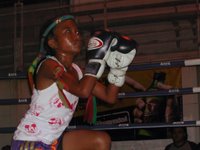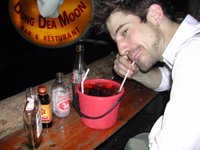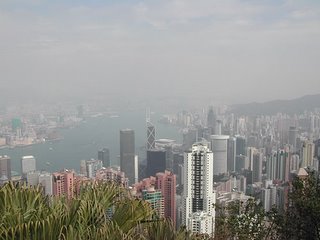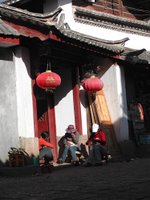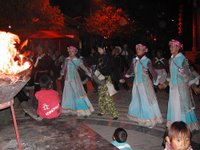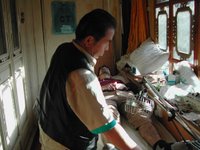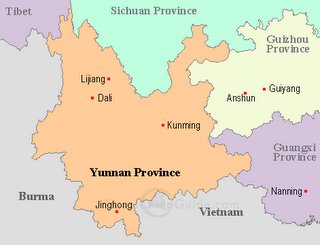February 8-11 Phuket
"Amazing Thailand" - Mimicking the Thai tourism ads, my pal Young repeats this in response to anything that can and does go wrong here in Thailand. After a smooth landing in Bangkok, the misadventures began as we moved on to Phuket in the south. As we anticipated an overnight (12-hour) bus ride, we chipped in a few extra baht for the first class "VIP" bus, which entails all the trimmings of a business class flight: cozy seats, air conditioning, a stewardess, and possibly personal t.v. units. I say possibly because, well, we never made it on the VIP bus. We had a ticket, purchased a day ahead of schedule, but somewhere along the miscommunication between us and the ticket window staff, we got our first class ticket - for the same day, not the following. Thus as we showed up at the southern bus station, sweating and short of breath after barely making the 8pm departure, we were puzzled as to why two people were sitting in our seats. In fact, the stewardesses couldn't figure it out either. No one could, until one observant passenger pointed out that our ticket was for the day before, and our bus was 24 hours long gone. The station crew, as accomodating as they were, refused to refund us, but offered us two empty seats on the second class bus, which is pretty much what I'm used to when taking the Greyhound bus from home to State College or elsewhere. We were disappointed because our tickets were twice the cost of a second class, but in the end, we're talking a difference of $10 and $20, though $10 goes a long way in Thailand. That's 10 beers, 4-5 hours of massage, or an air-conditioned room for a night. The ride wasn't bad, and we managed to sleep through most of the full-volume Thai dvd moviefest.
To sprinkle a little salt on our wounds, we arrived at our guesthouse, where Young had called and reserved a double room days ahead of time. As you can probably imagine where this is going, they had never heard of us and had nothing to show for it. Again, "Amazing Thailand". With 30kg of luggage strapped to my back, we plowed onward, from place to place, until we found an overpriced, oversized room, where at this point, we didn't take a liking to continuing the hunt for cheap rent. December to April, the so-called "dry season", is the peak season for visitors, and of course the prices double, sometimes triple. Our room was 1200 baht (~$26) for two, compared to the same accomodation for 440 baht in Bangkok. Phuket, a reknowned tourist town, was exactly that - a haven for divers, drinkers, and tail-chasers. It's not the first place in Thailand to bring your kids, though I was surprised while having a beer at a transgender go-go bar to find myself next to a Korean couple and their pre-teen kids, clapping and staring in awe (as did I) at the view.
The nightlife might not be as classy as the Seoul scene, but the diving here certainly makes up for it. I had an amazing two days deep in the Andaman Sea - and got my advanced open water diving license in the process! Young, a experienced diving instructor, took me on as his student during our five dives and after having completed the various underwater skills and reviewing the PADI textbook, I left with a new rank in the deep sea circuit. The skills were actually no different than what my Penn State instructor drilled into us as beginner students. As I realized only after this latest excursion, my PSU class was far more in depth (no pun there) than most open water dive courses, which makes sense considering my class was 24 hours of class and pool time vs. the usual two day on-site crash course. Unfortunately there was no night dive, which I was very much looking forward to, but the deep wreck dive was mindblowing. At a depth of about 30-33 meters (100-110 ft.) lay an ocean transit ferry that scraped a coral reef in 1997. As we were told, all 600 passengers survived, being that the water is air temperature and there were a dozen fishing vessels in the vicinity. However, there was no shortage of life forms on this ship - just not the original 600 passengers. We saw a sea turtle, barracudas, clown fish (Nemo!), spotted groupers, angel fish, and schools upon schools of unknown but beautiful species. We actually swam through enclosed parts of the deck and stern areas. Because the front of the ship collapsed during its demise, the ship's commodes were exposed to the ocean, which would've made for a great photo if my camera were waterproof. The only frustrating aspect of this venture, aside from turning green on the first day after a night on the town (kids, don't drink and dive), was the human traffic. There were so many divers from the 100+ dive shops in town that it would occasionally get frustrating as I tried to enjoy a serene moment, get a better view of something, or simply navigate without having camera-clicking sea tourists bump into me from above and below. I even got a fin kick in the stomach as one unaware diver passed me from below. I found it humorous that a school of 5,000 fish can twist and turn on the dime and never once bump scales with a fellow schoolmate, but the more sophisticated species with 75-years of underwater technology can't seem to find enough room in the sea to negotiate a pass without someone getting a maskful. I had a handful of more abstract ideas while underwater as well, some of which could've been from the deep-depth hysteria that many experience (I missed the buzzwagon, so far as I could tell). When divers from different dive shops pass each other underwater, they typically give the thumb and first finger "ok?" sign. Frustrated by the traffic, I wondered at one point what would happen if I gave them the finger instead - what could they do? Start a brawl at 50 feet under? Report me to big daddy PADI? I wasn't buzzed enough to find out.


